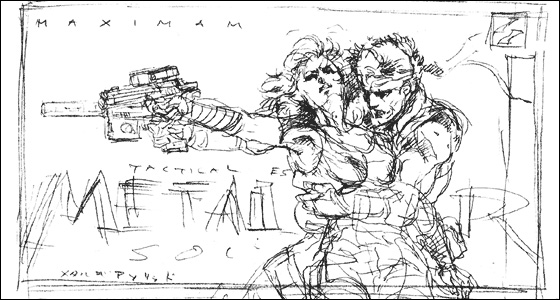Metal Gear Solid Novelization Break down (Part #1 Impressions)
March 27th, 2009

I was going to cram all of this into one mammoth article, but I’ve been a bit behind the ball with posting lately (no shortage of ideas though, just other distractions) and there is more than enough hear to fill a regular article. So here is part one of my thoughts on the MGS novel. The second part is a comprehensive list of all the differences between novel and game.
Background
Back in November last year while studying abroad in Shanghai, I by chance stumbled upon a novelization of the original Metal Gear Solid in one of the many bookstores just off the People’s Square. Far too entrenched in the Chinese lifestyle and language, I decided to read the book once I returned home in Australia, and over the past few weeks I’ve been just doing that. These are my thoughts.
Metal Gear Solid (novel) was published as a paperback on May 27, 2008 in America and over a week later in Europe on June 5, 2008. The novel was written by Raymond Benson, most notably known for his contributions to the James Bond series of novels between 1997-2003. Metal Gear Solid is the depiction of the events of the Shadow Mosses incident just as it were in the original video game.
General Impressions (Review)
Metal Gear Solid is by no means a reinterpretation of the original Shadow Mosses incident. The book rarely delves deeper into the characters, plot or themes any more so than I believe Hideo Kojima’s script would allow, rather author Raymond Benson is mostly a scribe for the game, intervening with the text where possible and necessary, often doing so to great effect.
This isn’t so much a review of the storyline as it is the novelization of the video game, so the documenting of the already static sequences (codec conversation and cut scenes) aren’t really worth discussing. Benson writes as these sequences purpose, and captures the essence of the cut scenes and codec sequences well.
When it comes to what one might call the player narrative though, Benson’s experience within the espionage writing genre is faithful to the Metal Gear Solid experience and lore. What was once your own means for tackling the game, has now become ingrained in the Solid Snake character. Where as a player might rely on a knowledge of conventions they’ve learnt from other games, Snake’s methodology is based upon lessons taught to him Master Miller, prior experiences in the field and training. Perhaps Benson’s greatest strength in this book is substantiating Snake’s prior knowledge and then channeling this back to the relevant characters, plot and dialogue at hand. This makes Snake’s mindset seem all the more real. Snake’s tactics within the natural environment draw on his experience of living in Alaska, his combat derived from lessons taught by Master Miller, dialogue from Campbell, Naomi and Mei Ling’s relevant to the chaos unfolding. Miller in fact is heavily called upon, replacing Mei Ling as the feature’s Confucious of wisdom.

The necessary intervention at the point of where video games and writing don’t meet (the player) allows Benson to better contextualize Snake as a character. When he changes the already fixed narrative itself, the book become a little problematic, as he’s clearly playing with things he perhaps shouldn’t be. Thankfully, beyond the few exceptions where he does this, the story is just as you remember it.
It’s difficult to say if I would recommend this book, as the text is only fodder to picturize the game unfolding in your head. If you haven’t ever played the video game then, I’d probably recommend you play that, rather than read about it. I doubt that the hybridized interactive manga/film/comic narrative translates outside of the medium that it was born. Overall though, this is a faithful, solid adaption of Metal Gear Solid to another format. Word has it that the sequel is also received an adaption by the same author, should be interesting.



 Game Design Companion: A Critical Analysis of Wario Land 4 - $7.99
Game Design Companion: A Critical Analysis of Wario Land 4 - $7.99 Level Design: Processes and Experiences
Level Design: Processes and Experiences Speed Boost: The Hidden Secrets Behind Arcade Racing Design - $5.99
Speed Boost: The Hidden Secrets Behind Arcade Racing Design - $5.99 Adventures in Games Analysis: Volume I - $5.99
Adventures in Games Analysis: Volume I - $5.99







